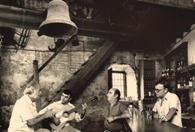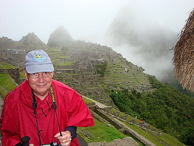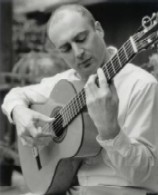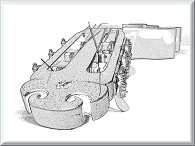Welcome to one of the most active flamenco sites on the Internet. Guests can read most posts but if you want to participate click here to register.
This site is dedicated to the memory of Paco de Lucía, Ron Mitchell, Guy Williams, Linda Elvira, Philip John Lee, Craig Eros, Ben Woods, David Serva and Tom Blackshear who went ahead of us.
We receive 12,200 visitors a month from 200 countries and 1.7 million page impressions a year. To advertise on this site please contact us.
|

|
|
RE: Tom's tutorial Manuel Reyes Flamenco negra
|
You are logged in as Guest
|
|
Users viewing this topic: none
|
|
Login  | |
|

   
Richard Jernigan
Posts: 3431
Joined: Jan. 20 2004
From: Austin, Texas USA

|
 RE: Tom's tutorial Manuel Reyes Flam... (in reply to Tom Blackshear) RE: Tom's tutorial Manuel Reyes Flam... (in reply to Tom Blackshear)
|
|
|
More on the comparison of the '82 Arcangel Fernandez blanca and Tom's latest Reyes negra:
As soon as Tom strummed a few chords on his new negra, I said, "Tom, that's a great guitar." After an hour of comparing the two, I still think so. I think both of them are great guitars, but they are different, so some people might like one better than the other, or some people might fall in love with both of them. I might be among the latter group.
Tom's guitar has more brilliant trebles than the Arcangel, played with the same touch. Tom remarked upon the "separation of notes" on the Arcangel. Trained as an engineer and physicist, I often have trouble understanding the usual guitar lingo. One hint to decoding "separation of notes" is that Tom said he could really dig in on the Arcangel, even in rasgueados.
The strings on the Arcangel were a well broken in set of Savarez "red cards" (520-R), but there was no visible wear of dirt on them. The strings on Tom's were two weeks old, presumably the D'Addarios he uses.
For the same stroke on both instruments, the trebles on Tom's guitar have more upper harmonic content than the Arcangel. At first I thought the Arcangel had more sustain than Tom's guitar, but more listening revealed that it wasn't the case. Maybe I had that impression as the upper harmonics decayed on Tom's guitar, but the character of the notes didn't seem to change as much on the Arcangel. Both instruments sustained for seconds on strongly produced chords.
I said I thought the Arcangel trebles reminded me of a great mezzo soprano, while the Reyes model was more like a coloratura.
Of course the basses on Tom's guitar had more harmonic content than the Arcangel as well, but it wasn't quite as obvious as with the trebles.
My recollection of the pulsacion of Tom's guitar was just a little stiffer than the Arcangel, but well within comfortable range.
After we had been comparing the two for a while Tom gestured, "Your guitar goes like this, mine goes like this." I interpreted his gestures to correspond to my impressions: the midrange on his guitar was slightly stronger than the treble and bass, while on the Arcangel, the bass and treble were slightly stronger than the midrange.
I was already driving back to Austin the next morning when my cellphone rang, displaying Tom's caller ID. In a minute or two I found a spot to pull over and returned the call. Tom spoke excitedly. He said he had lightly sanded four of the seven fan braces on his guitar to "give it an inverted pull like a real flamenco guitar."
I said I thought it already was a real flamenco guitar, but Tom said he thought he now had it just right. The light sanding on the braces had brought the "key" down to F#-G, just where he liked it, and it had the "inverted pull" of a true flamenco. As I said in a previous post, Tom told me that when he said "pull" it was pretty much what others called "pulsacion. I took the "inverted" part to mean slightly stronger trebles and basses, compared to the midrange.
As I said, I think they are both great guitars. I know the Arcangel much better, but I think I would very much enjoy getting to know Tom's guitar. New spruce guitars generally improve with age.
RNJ
|
|
|
|
REPORT THIS POST AS INAPPROPRIATE |
Date Jan. 20 2018 21:03:57
 |
|

   
Tom Blackshear
Posts: 2304
Joined: Apr. 15 2008

|
 RE: Tom's tutorial Manuel Reyes Flam... (in reply to Tom Blackshear) RE: Tom's tutorial Manuel Reyes Flam... (in reply to Tom Blackshear)
|
|
|
Hello again,
Here is a communication from an old friend who is a movie director who makes a lot of documentaries around the world.
Hi Tom, long time no talk to. I happened to come across one of your videos on Youtube again tonight, and it reminded me to email you.
We had a wonderful year in Spain, finally coming home in August 2015 for the new school year. I then went back in September 2016 for the Flamenco Bienal, which is an amazing experience, with all the best performers from around Spain in one place.
We just went back again last month for a combination spring break and work trip -- I've been wanting to shoot another documentary there again, or part of one, and I think I've been able to make that happen. I'll know in the next week or two if funding and scheduling line up to go back at the end of May for a week of shooting. Hoping so and looking forward to it!
This film will actually have a little bit of flamenco in it. It's part of a new PBS music series I'm trying to get off the ground. This episode would be on Scarlatti, who was greatly influenced by the music of Spain, and worked it into his keyboard compositions.
In the Youtube videos you're playing a Reyes-style negra. I have to ask, is that guitar for sale or already sold? I'm still really enjoying your 2006 Reyes-style blanca, in fact was playing it yesterday. It would be cool to have a negra sister.
_____________________________
Tom Blackshear Guitar maker
|
|
|
|
REPORT THIS POST AS INAPPROPRIATE |
Date Apr. 4 2018 19:03:31
 |
|
 New Messages New Messages |
 No New Messages No New Messages |
 Hot Topic w/ New Messages Hot Topic w/ New Messages |
 Hot Topic w/o New Messages Hot Topic w/o New Messages |
 Locked w/ New Messages Locked w/ New Messages |
 Locked w/o New Messages Locked w/o New Messages |
|
 Post New Thread
Post New Thread
 Reply to Message
Reply to Message
 Post New Poll
Post New Poll
 Submit Vote
Submit Vote
 Delete My Own Post
Delete My Own Post
 Delete My Own Thread
Delete My Own Thread
 Rate Posts
Rate Posts
|
|
|
Forum Software powered by ASP Playground Advanced Edition 2.0.5
Copyright © 2000 - 2003 ASPPlayground.NET |
0.1015625 secs.
|


 Printable Version
Printable Version











 New Messages
New Messages No New Messages
No New Messages Hot Topic w/ New Messages
Hot Topic w/ New Messages Hot Topic w/o New Messages
Hot Topic w/o New Messages Locked w/ New Messages
Locked w/ New Messages Locked w/o New Messages
Locked w/o New Messages Post New Thread
Post New Thread